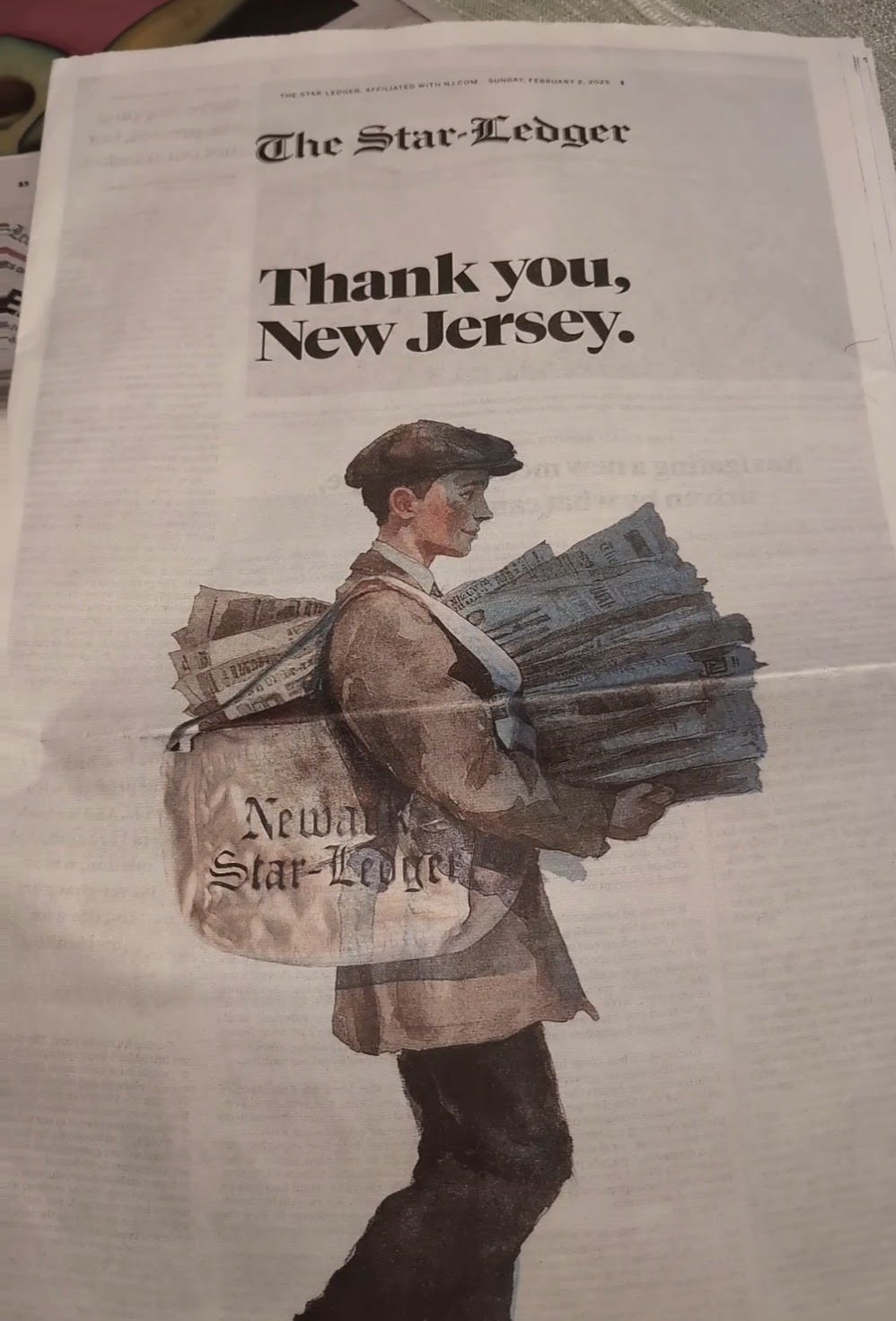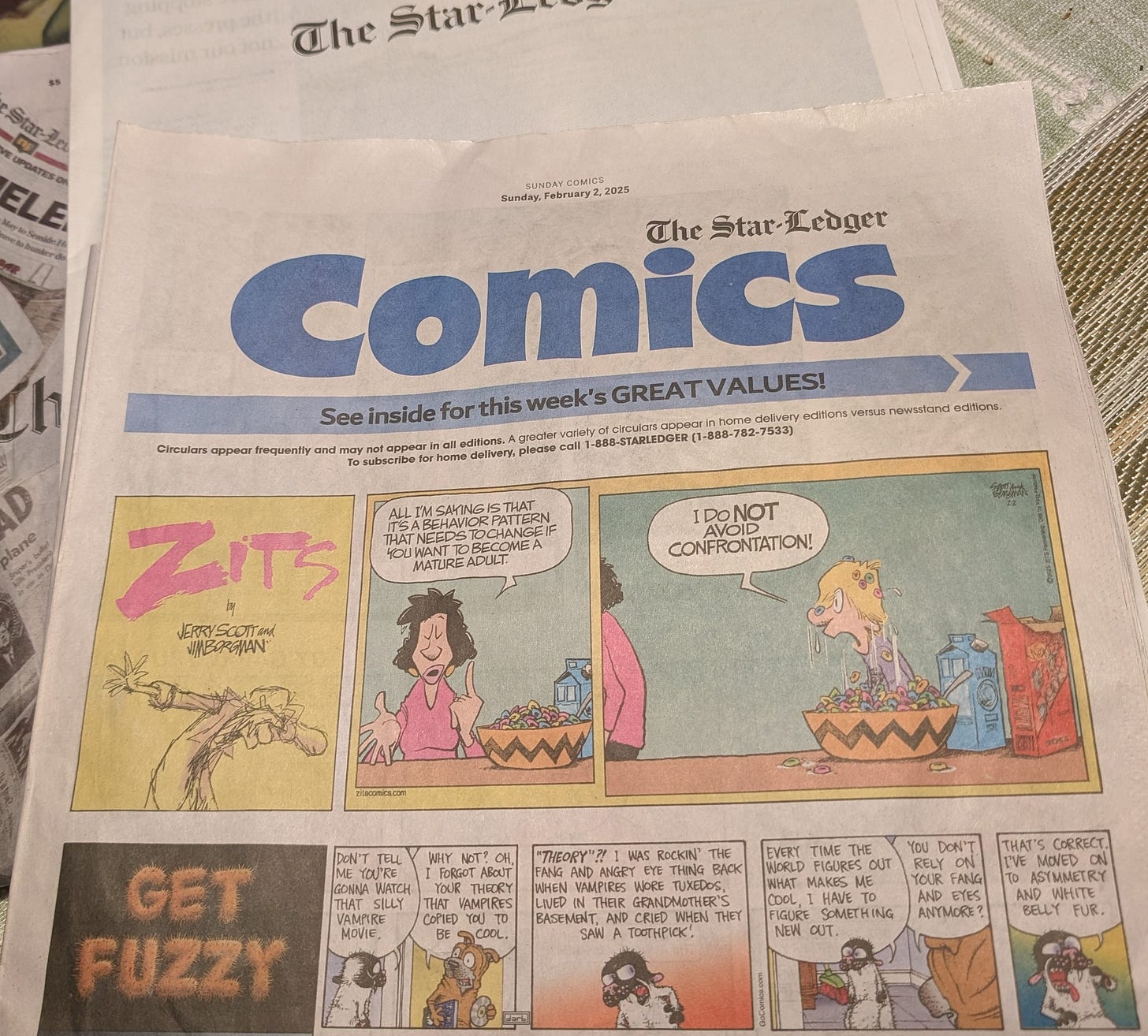Yesterday, The Star-Ledger, once one of the nation’s largest newspapers and the voice of New Jersey, ceased printed publication.
“We’re going online,” the ads shout. “You can get the same newspaper you love in its newspaper format,” they say.
All I can do is sigh.
Am I going to subscribe to the online paper? For a while, probably yes. Am I going to read the comics online? I don’t know. I’ve dipped into the online edition—it has been around (and has been improving) for many years now. But still, it’s not a newspaper.
ASIDE: The New York Times just published a kind of obituary for The Ledger. Here’s a free-to-read link to the Times story.
The Magic of Ink on Paper
The “magic,” if you will, of a newspaper, especially a broadsheet with its wide expanse of paper, is the opportunity a reader has to discover things the reader didn’t know about. Or didn’t appreciate. Or didn’t think related to other things.
In a real newspaper, you had experienced editors placing stories, writing headlines, and organizing an informative news briefing. You could gather a ton of information from just the headlines. You might be drawn into one story and then see that the story next to it is closely related and relevant. And of course, you could clip a comic, save it for a future Quadrants post, or some other missive. Clip a recipe, too.
Look, I’m prejudiced. My parents worked in the newspaper business. I was born, they said, with a little printer’s ink in my blood. I love newspapers.
My courtship with The Ledger
I spent many years admiring The Ledger.
I’ve been a subscriber since 1980. I watched the newspaper transform over the years from the “gray lady” that I thought it was in the early years when Mort Pye was the editor into a helluva good paper led by Jim Wilse. I exchanged a few e-mail messages with Wilse in the early 2000s when he was guiding the paper to two Pulitzer Prize wins.
I even managed to get a job interview—and there’s a good story that goes with that.
Sometime in that early 2000s era, The Ledger ran the famous “Yes, Virginia; there is a Santa Claus” editorial on Christmas Eve (or maybe Christmas Day—I don’t recall exactly.)
I saw it and sent a job pitch letter and packet to Wilse. I enclosed a copy of the weekly newspaper I had published back in the early 1980s—one of the Christmas week editions when I had re-run the “Yes, Virginia” editorial.
My pitch made enough of an impression to get me an interview. Fortunately or unfortunately, the meeting didn’t lead anywhere. I think the business was already feeling the impact of the Internet. So I didn’t catch on. But I tried, goodness know, I tried.
ASIDE: Here’s link to a nice story about Virginia, her letter and the editorial. It includes images of the letter and article, transcripts, and more background. Very nice.
What We are Losing
There was the great sports section. Everything up to press time made it into print. The classifieds. I bought several cars there, and found a job at an ad agency there, too. The comics which used to be two full pages. Sunday comics. Parade magazine. All stuff that I read, touched and remember.
And oh, my goodness! No comics!
No Sunday comics? No weekday comics?
Hard to bear.
But more importantly, The Ledger had a large reporting staff that covered the town meetings and zoning hears and delved into everything that was going on. They shined light in dark corners and called officials and others to account.
The Star-Ledger was a great newspaper.
I will hold out hope for its future. I hope that its new cadre of online journalists will do as good a job as possible and maybe even better. I hope it successfully makes the transition to digital-only and grows and prospers. I’m rooting for these guys. I believe their work is really important.
I wish them the best and I hope they are able to do some great journalism.
But I’m going to miss that great newspaper.
Anon.
Ridge
p.s. About the headline on this post. Back in the days when reporters hammered out stories on copy paper, reporters would code additional pages as “adds.” You’d have a slug line at the top of the page—”BIG STORY ABOUT MAYOR”—and tag it as a first add, second add, and so on. And when the reporters reached the end of the story, they’d type, centered under the last line of their copy: -30-
The End
R.







I loved walking through the linotype shop at NEA with Dad, hearing the plinking of the lines of type and the heat coming from the melted metal. I loved walking through the press room at the Hollywood Sun Tattler, a long-ago daily newspaper in Hollywood, Florida. I loved the smell of newsprint and ink, and watching the miracle that happened every day, the production of a daily newspaper as Dad would say. He has been gone for over 50 years. Remember, our father was head of R & D at Scripps Howard and he said that newsprint would go away. He said how the media would change due to new technologies, and he embraced that, he helped make what we have now. He said that papers like the WSJ would be transmitted by satellite to cities around the world to be printed, he said we would sit at home and watch movies from the movie theaters. He said we would shop from home. Every time one of the things he said would happen, I would pause and say wow he was right. There is a sweet remembrance of what we had and I am glad you are sharing the honoring of traditions of this daily miracle.